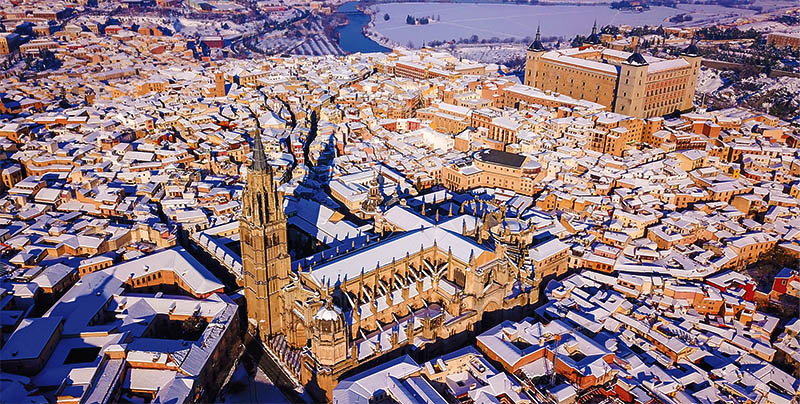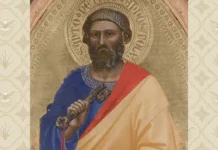The more completely Christian a civilization is, the more true, more lasting and more productive of genuine fruit it will be. On the other hand, the further it draws away from the Christian ideal, the more seriously the social order is endangered.
The Church, even in preaching Jesus Christ crucified, stumbling block and folly to the world (cf. 1 Cor 1:23), has become the foremost leader and protector of civilization. She propagated it wherever her apostles preached. She preserved and perfected the good elements of the ancient pagan civilizations, disentangling from barbarism and educating for a new civilization the peoples who flocked to her maternal bosom. She endowed all of society – gradually, but with a certain and ever more progressive step – with that excellent mark which is today universally preserved.
The civilization of the world is Christian. The more completely Christian it is, the more true, more lasting and more productive of genuine fruit it will be. On the other hand, the further it draws away from the Christian ideal, the more seriously the social order is endangered.
If the ideal of Christian civilization is realized, peace will be established in the world
Thus, due to the intrinsic nature of things, the Church has become the guardian and protector of Christian civilization. This fact was universally recognized and admitted in other periods of history, and even formed the solid foundation for civil legislation. On this very fact rested the relations between Church and State; the public recognition of the authority of the Church in those matters which touched upon conscience in any manner, the subordination of all the laws of the State to the divine laws of the Gospel; the harmony of the two powers in securing the temporal welfare of the people in such a way that their eternal welfare did not suffer.
We have no need to tell you, Venerable Brethren, what prosperity and well-being, what peace and harmony, what respectful subjection to authority and what excellent government would be obtained and maintained in the world if the perfect ideal of Christian civilization were realized everywhere.
Granting, however, the continual battle of the flesh against the spirit, darkness against light, Satan against God, such cannot be hoped for, at least in all its fullness. Hence, raids are continually being made on the peaceful conquests of the Church. The sadness and pain these cause is accentuated by the fact that society tends more and more to be governed by principles opposed to that very Christian ideal, and is even in danger of completely falling away from God.
To restore all things in Christ, including civilization
This fact, however, is no reason to lose courage. The Church well knows that the gates of hell will not prevail against her. Furthermore, she knows that she will be sorely afflicted; that her apostles are sent as lambs among wolves; that her followers will always bear the brunt of hatred and contempt, just as her Divine Founder received hatred and contempt. So the Church advances unafraid, spreading the Kingdom of God where it has not yet been preached and studying every possible means she can use in recovering the losses in the Kingdom already conquered.
“To restore all things in Christ” has always been the Church’s motto, and it is especially Our Own during these fearful moments through which we are now passing. “To restore all things” – not in any haphazard fashion, but “in Christ”; and the Apostle adds, “both those in the heavens and those on the earth” (Eph 1:10). To restore all things in Christ includes not only what properly pertains to the divine mission of the Church, namely, leading souls to God, but also what We have already explained as flowing from this divine mission, namely, Christian civilization in each and every one of the elements composing it.
Since We particularly dwell on this last part of the desired restoration, you clearly see, Venerable Brethren, the services rendered to the Church by those chosen bands of Catholics who aim to unite all their forces in combating anti-Christian civilization by every just and lawful means. They use every means in repairing the serious disorders caused by it, seeking to restore Jesus Christ to the family, the school and society by re-establishing the principle of human authority as representative of that of God. They take to heart the interests of the people, especially those of the working and agricultural classes, not only by inculcating in all hearts a true religious spirit (the only true fount of consolation amid the troubles of this life) but also by endeavouring to dry their tears, to alleviate their sufferings, and to improve their economic condition by wise measures. They strive, in a word, to make public laws conformable to justice and to amend or suppress those which are not so. Finally, they defend and support in a true Catholic spirit the rights of God in all things and the no less sacred rights of the Church. […]
Adapting to what is nonessential, faithful to that which is immutable
It should indeed be noted here that not every institution which in past centuries may have been useful or even the only effective one can be re-established under the same form, so many are the radical changes introduced over time into society and public life, and so numerous are the new needs which the changing circumstances continually produce.
But the Church in her long history and on every occasion has wisely shown that she possesses the marvellous power of adapting herself to the changing conditions of civil society. Thus, while preserving the integrity and immutability of Faith and morals and upholding her sacred rights, she easily bends and accommodates herself, in all that is unessential and accidental, to the vicissitudes of the times and to the new requirements of society.
Piety, says St. Paul, adjusts itself to everything, for it has the divine promise, for both the goods of this life, and that of the future: “Godliness is of value in every way, as it holds promise for the present life and also for the life to come” (1 Tm 4:8). ◊
Excerpts from: ST. PIUS X.
Il fermo proposito, 11/6/1905
In the featured photo, aerial view of the city of Toledo (Spain), with the cathedral in the foreground







